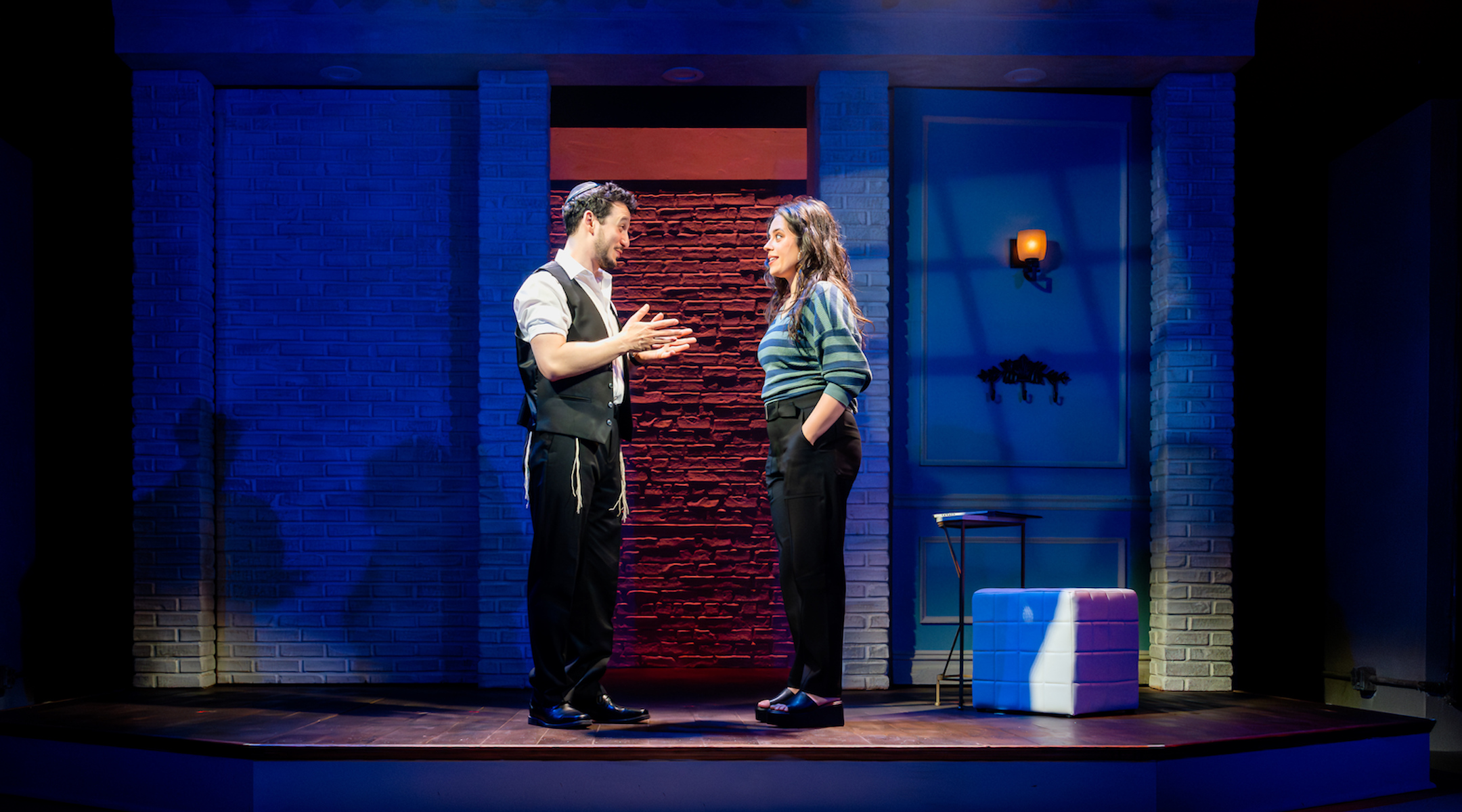It’s Friday night, and Angie, an ambitious Italian-American gallerist from New Jersey has just moved into her new Upper West Side apartment. She’s worrying about work when someone knocks on her door: It’s Seth, the Orthodox Jewish guy down the hall, who asks her if she could possibly be his “Shabbos goy” and turn on his air-conditioning unit.
It’s perhaps the most New York meet-cute of all time, and it’s the premise of “Sabbath Girl,” a musical rom-com playing at 59E59 Theaters through Sept 1.
Over the course of many Shabbats, Seth continues to call on Angie, who helps him fix light bulbs, adjust his air conditioning and answer his phone. Inevitably, during these Friday night hangs, the pair fall in love.
Written by Cary Gitter, who grew up in a Reform household in Bergen County, New Jersey, the story is inspired by his parents’ relationship — his mother is from an Italian-American family and his father is from a Jewish one.
“I grew up kind of with one foot in both worlds and wanted to draw on that,” Gitter, who is in his mid-30s, told the New York Jewish Week. “I would never have written this, had I not grown up where I did, with my own background, and I think the material speaks most powerfully, probably, to people who share some of that common ground.”
He said was also inspired by romantic comedies from the 1980s and 1990s like “When Harry Met Sally” and “Crossing Delancey.”
“I’ve always loved that romantic comedy form, which is much more common in film than it is on the stage,” he said. “I always wanted to tell a New York story. I wanted to write something fresh in that genre that was about people from different cultures coming into contact, which is such a quintessentially New York phenomenon. I just wanted to write something that was warm and heartfelt and positive and earnest and a little bit of a breath of fresh air.”
Gitter wrote the script as a play in 2017, and it first was produced by Penguin Rep Theater in Stony Point in Rockland County, New York in early 2020. Since then, Gitter worked with composer and lyricist Neil Berg alongside the show’s director Joe Brancato to transform the play into a musical.
“It was exciting for me for [Gitter] to experience how music can inform emotion in a way that spoken word cannot,” said Berg, who also composed the off-Broadway shows “The Prince and The Pauper” and “Grumpy Old Men: The Musical.”
Berg, who is also Jewish and is in an interfaith marriage, said transforming the play to a musical spoke to him personally. “I’ve written many big musicals, and I always wanted to write a smaller, more intimate type of show,” he said. “I didn’t write it with an agenda, but I do think there’s hopefully a spirit of empathy and understanding that comes through in the piece that people can take home with them as food for thought, or as something to feel good about.”
Like every good rom-com, the protagonists must endure several roadblocks before they unite as a couple. In the case of “Sabbath Girl,” Seth (Max Wolkowitz) is recently divorced, having fled his community out of shame. His older sister, Rachel (Lauren Singerman), wants Seth to move back to Riverdale and remarry. Seth grapples with the pressure to remain in his somewhat insular Orthodox community while harboring a dream to become a short story writer.
In many ways, the play echoes “Crossing Delancey” — though instead of pickles, Seth runs a knish store on the Lower East Side that was opened by his grandfather. Seth has grand plans to modernize the flavors and offerings, but his sister is reticent for one reason: tradition — a metaphor for her stubborn outlook on Seth’s romantic choices.
Meanwhile, Angie (Marilyn Caserta), who owns a struggling Lower East Side gallery, gets distracted trying to woo a big-egoed up-and-coming artist who is interested in a business relationship with her — and more.

Rachel and Seth run their grandparent’s knish store together. (Dorice Arden Madronero)
While Rachel initially comes off as close-minded and judgmental, she explains to Seth that her judgment is based out of fear — fear that Angie won’t understand Seth’s lifestyle, that if he leaves he may never come back, that antisemitism is rising. “We’re safer when we’re together,” she tells Seth. Angie must convince Rachel that she loves celebrating Shabbat, loves knishes and most of all, loves Seth.
While the story tackles big questions in the Jewish community — like assimilation, interfaith relationships and antisemitism — the musical’s breezy, rom-com format means that audiences can expect a humorous journey to a happy ending.
“People of the Jewish faith know there’s a lot of drama and seriousness to the history of our people. It was Mel Brooks who said ‘You have to also be able to laugh,’” said Berg. “Our best defense is to put everything out in the open and find a way to laugh about it.”
Still, he added that “Sabbath Girl” can resonate with anyone, regardless of their background. “It’s a rom-com, but it packs a punch,” he said. “It deals with serious topics and there’s an underlining aspect of it that connects to many people, not just Jews and Italians, but certainly any people of difference.”
“Sabbath Girl” is playing at 59E59 Theaters (59 East 59th St.) through Sept 1. Get tickets starting at $66.
The New York Jewish Week brings you the stories behind the headlines, keeping you connected to Jewish life in New York. Help sustain the reporting you trust by donating today.





